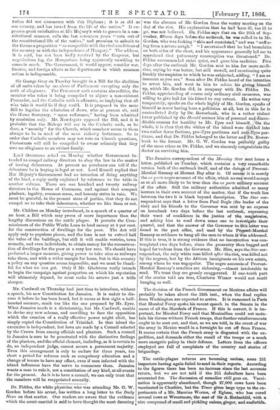Dr. Fiddes, the white physician who was attending Mr. G.
W. Gordon before his arrest, has written a long letter to the Daily News on that matter. Our readers are aware that the evidence which the court-martial is said to have thought the most damning was the absence of Mr. Gordon from the vestry meeting on the day of the riot. His explanation that he had been ill, too ill to go, WAS not believed. Di Fiddea says that on. the 26th of Sep- tember, fifteen days beforedhe outbreak, he was called in to Mr. Gordon, who was looking "thin and .emaciated," and was "suffer- ing from a severe cough." "I ascertained that lie had bronchitis on both sides of the chest, and his appearance generally led me to apprehend that pulmonary consumption was threatened." Dr. Fiddes recommended strict quiet, and gave him medicine. Five days after the outbreak Mr. Gordou sent .to him for more medi- cine, saying he was better, but still unwell, and mentioning quite /rankly the suspicion to which he was subjected,.adding, "I am as innocent as you are." Soon after Dr. Fiddes heard of the intention to arrest him, and went to him to advise •his giving, himself up, which Mr. Gordon did, in company with Dr. Fiddes. Dr. Fiddes, apprehending of course only ordinary-civil measures, was willing to give bail for his friend to any extent. He writes very temperately, speaks on the whole highly of Mr. Gordon, speaks of himself as never having heen a politician at all, but in this he is contradicted flatly by Dr. Bowerbank, who in a rather violent letter published by the Herald accuses him of personal andeliscre- ditable reasons for hostility to Mr. Eyre and himself. :On the whole, it is clear that the whites of the island were divided into two rather fierce ffictions, pro-Byre partizans and ang-Myre par- tizans, and that Dr. Fiddes belonged to the latter and'Dr. Bower- bank to the former. Mr. G. W. Gordon was probably guilty of the same crime as Dr. Fiddes, and we sincerely congratulate the doctor on surviving him.






























 Previous page
Previous page